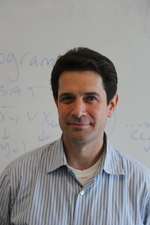About the Authors

Kai-Min Chung
Assistant Research Fellow
Academia Sinica, Taiwan
kmchung[ta]iis[td]sinica[td]edu[td]tw
www.iis.sinica.edu.tw/~kmchung/
Assistant Research Fellow
Academia Sinica, Taiwan
kmchung[ta]iis[td]sinica[td]edu[td]tw
www.iis.sinica.edu.tw/~kmchung/
Kai-Min Chung received a bachelor's degree from National Taiwan University in 2003, and a Ph.D. from
Harvard University
in 2011. His advisor was
Salil Vadhan. After his
Ph.D., he was a postdoctoral researcher at
Cornell University for three years and
supported by a Simons postdoctoral fellowship in 2010-2012.
He is currently an assistant research fellow at
Academia Sinica in Taiwan.
His research interests include cryptography, complexity theory, and
pseudorandomness. His work on parallel repetition for interactive
arguments received a Best Student Paper award from the
Theory of Cryptography Conference in 2010.

Michael Mitzenmacher
Professor
Harvard University, Cambridge, MA
michaelm[ta]eecs[td]harvard[td]edu
www.eecs.harvard.edu/~michaelm/
Professor
Harvard University, Cambridge, MA
michaelm[ta]eecs[td]harvard[td]edu
www.eecs.harvard.edu/~michaelm/
Michael Mitzenmacher is a Professor of Computer Science in the School
of Engineering and Applied Sciences at
Harvard University;
from 2010 to 2013, he also served as Area Dean of Computer Science.
He graduated summa cum laude with a B.A. in
mathematics and computer science from Harvard in 1991. After studying
mathematics for a year in Cambridge, England, on the Churchill Scholarship,
he obtained his Ph.D. in computer science at
U.C. Berkeley in 1996
under the supervision of
Alistair Sinclair.
He then worked at Digital Systems Research Center until joining the
Harvard faculty in 1999. His work on
low-density parity-check codes shared the 2002 IEEE Information Theory
Society Best Paper Award and received the 2009 ACM SIGCOMM Test of Time
Award. His textbook with Eli Upfal on randomized algorithms and probabilistic
techniques in computer science was published in 2005 by Cambridge
University Press.

Salil Vadhan
Vicky Joseph Professor
Harvard University, Cambridge, MA
salil[ta]seas[td]harvard[td]edu
people.seas.harvard.edu/~salil/
Vicky Joseph Professor
Harvard University, Cambridge, MA
salil[ta]seas[td]harvard[td]edu
people.seas.harvard.edu/~salil/
Salil Vadhan is the Vicky Joseph Professor of Computer
Science and Applied Mathematics at
Harvard University. He received
an A.B. summa cum laude in mathematics and computer science from
Harvard University in 1995, a Certificate of Advanced Study with
distinction in mathematics from
Cambridge University in 1996, and a
Ph.D. in applied mathematics from MIT
in 1999 (under the supervision of
Shafi Goldwasser).
Vadhan was an NSF mathematical sciences
postdoctoral fellow at MIT and the Institute for Advanced Study
before joining the Harvard faculty in 2001. He has held visiting
positions at the Radcliffe Institute for Advanced Study at
Harvard University, the Miller Institute for Basic Research in
Science at
U.C. Berkeley,
Microsoft Research Silicon Valley, and
Stanford University, and was
director of the Harvard Center for Research on Computation and
Society from 2008-11.
Vadhan's research is in computational complexity and
cryptography, with specific interests including zero-knowledge
proofs, pseudorandomness, and differential privacy. His
Ph.D. thesis on statistical zero-knowledge proofs received the
ACM Doctoral Dissertation Award 2000 and his work on expander
graphs with
Omer Reingold
and Avi Wigderson received a
Gödel Prize in 2009. He has also
received a Sloan Fellowship and a Guggenheim Fellowship, and was
named a Simons Investigator in 2013. He currently leads a large,
multidisciplinary project on “Privacy Tools for Sharing Research
Data” at Harvard University.
